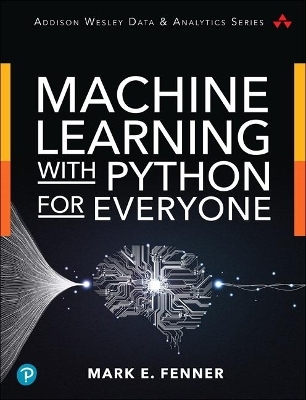
Machine Learning with Python for Everyone
Addison Wesley (Verlag)
978-0-13-484562-3 (ISBN)
Machine Learning with Python for Everyone will help you master the processes, patterns, and strategies you need to build effective learning systems, even if you're an absolute beginner. If you can write some Python code, this book is for you, no matter how little college-level math you know. Principal instructor Mark E. Fenner relies on plain-English stories, pictures, and Python examples to communicate the ideas of machine learning.
Mark begins by discussing machine learning and what it can do; introducing key mathematical and computational topics in an approachable manner; and walking you through the first steps in building, training, and evaluating learning systems. Step by step, you'll fill out the components of a practical learning system, broaden your toolbox, and explore some of the field's most sophisticated and exciting techniques. Whether you're a student, analyst, scientist, or hobbyist, this guide's insights will be applicable to every learning system you ever build or use.
Understand machine learning algorithms, models, and core machine learning concepts
Classify examples with classifiers, and quantify examples with regressors
Realistically assess performance of machine learning systems
Use feature engineering to smooth rough data into useful forms
Chain multiple components into one system and tune its performance
Apply machine learning techniques to images and text
Connect the core concepts to neural networks and graphical models
Leverage the Python scikit-learn library and other powerful tools
Register your book for convenient access to downloads, updates, and/or corrections as they become available. See inside book for details.
Dr. Mark Fenner, owner of Fenner Training and Consulting, LLC, has taught computing and mathematics to diverse adult audiences since 1999, and holds a PhD in computer science. His research has included design, implementation, and performance of machine learning and numerical algorithms; developing learning systems to detect user anomalies; and probabilistic modeling of protein function.
Chapter 1: Let’s Discuss Learning
Chapter 2: Some Technical Background
Chapter 3: Predicting Categories: Getting Started with Classification
Chapter 4: Predicting Numerical Values: Getting Started with Regression
Part II: Evaluation
Chapter 5: Evaluating and Comparing Learners
Chapter 6: Evaluating Classifiers
Chapter 7: Evaluating Regressors
Part III: More Methods and Fundamentals
Chapter 8: More Classification Methods
Chapter 9: More Regression Methods
Chapter 10: Manual Feature Engineering: Manipulating Data for Fun and Profit
Chapter 11: Tuning Hyperparameters and Pipelines
Part IV: Adding Complexity
Chapter 12: Combining Learners
Chapter 13: Models That Engineer Features for Us
Chapter 14: Feature Engineering for Domains: Domain-Specific Learning
Chapter 15: Connections, Extensions, and Further Directions
| Erscheinungsdatum | 12.03.2019 |
|---|---|
| Reihe/Serie | Addison-Wesley Data & Analytics Series |
| Verlagsort | Boston |
| Sprache | englisch |
| Maße | 178 x 229 mm |
| Gewicht | 930 g |
| Themenwelt | Informatik ► Datenbanken ► Data Warehouse / Data Mining |
| Mathematik / Informatik ► Informatik ► Programmiersprachen / -werkzeuge | |
| Informatik ► Theorie / Studium ► Künstliche Intelligenz / Robotik | |
| Mathematik / Informatik ► Informatik ► Web / Internet | |
| ISBN-10 | 0-13-484562-5 / 0134845625 |
| ISBN-13 | 978-0-13-484562-3 / 9780134845623 |
| Zustand | Neuware |
| Informationen gemäß Produktsicherheitsverordnung (GPSR) | |
| Haben Sie eine Frage zum Produkt? |
aus dem Bereich


